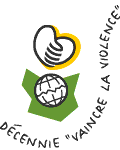Together on the Way Towards Just Peace
A Declaration on Peace
by Students of the University of Hamburg / Germany
Download the full text "Together on the Way Towards Just Peace" (pdf, bilingual - English/German)
Preface
In 2006 the delegates of the 9th Assembly of the World Council of Churches (WCC) decided to mark the end of the "Decade to Overcome Violence. 2001-2010" with an International Ecumenical Peace Convocation in 2011. On the one hand this will be the culmination of a ten-year common journey of formation, not only for the member churches of the WCC. On the other hand the Peace Convocation shall provide a stimulus for the next steps.
On the way to the Convocation an Ecumenical Declaration on Just Peace is to be developed, which will be adopted in its final version at that Peace Convocation. This requires a participatory process, which should provide an opportunity for many to contribute to the development of such a declaration.
In spring 2007 a letter was sent out by the WCC to universities, theological faculties and seminaries all over the world, inviting them to become part of this process by offering respective courses. In such courses the goal would not simply be to teach contents, but the students are invited and asked to in fact elaborate their own peace declaration. In the Institute of Peace Church Theology at the University of Hamburg and in the department "Overcoming Violence" of the Northelbian Ev.-Lutheran Church we instantly agreed to get involved in this adventure of learning by writing in a group process.
The project was designed for a period of two semesters: in the Winter Term we concentrated on the German context, starting with an analysis of the Barmen Theological Declaration of 1934. The founding of the WCC in 1948, which was strongly influenced by the discussions on peace theology and the Stuttgart Declaration of Guilt of the Protestant churches in Germany provided the historical-political starting point for further explorations: we read and discussed the peace declarations of the Evangelical Church in Germany, starting with the Heidelberg Theses of 1959 up to the latest one "Aus Gottes Frieden leben - für gerechten Frieden sorgen", which was issued during our first term. In order to gain an ecumenical perspective it was indispensable to add documents from other church traditions: the Roman-Catholic Church, the Methodist Church as well as from the Historic Peace Churches. Several meetings were spent discussing the theological and ethical implications of the Conciliar Process for Justice, Peace and the Integrity of Creation in East- and in West-Germany, especially the Ecumenical Assembly in the former GDR and its political implications and influence in society, up until the massive changes in 1989.
In the Summer Term of 2008, equipped with this knowledge we were ready to do some "deep drilling" - with additional help by some experts - into some of the current global challenges, which should not be missed in a peace declaration of the 21st century: interreligious relations, economic globalization, and the "new wars" influenced by it. We explored strategies to overcome violence like the pacifying function of law and new approaches of restorative justice, the concept "Responsibility to Protect" and initiatives to build a culture of non-violence. We became aware of how much the assessment of different dimensions of violence and overcoming violence depends on our own point of view: the context, the religious formation, level of education, theological positions as well as preconceptions, which become evident in dialogue.
In the accompanying tutorial the new insights were to be converted into a common text. We soon recognized that this was not an easy task. Unanswered questions had to be discussed further, dissensions had to be resumed or tolerated, and only after that were we able to start to formulate a text. The seminar as well as the tutorial were characterized by an atmosphere of mutual appreciation and acceptance, which made it possible for the participants to enter into honest dialogue.
In the end we had many additional meetings, which were attended by the students voluntarily - far beyond the required seminar hours. It became in fact an adventurous learning process for all of us. Additional motivation arose from the invitation to present our project to the international Team-Visit of the WCC to Germany at the end of our Summer Term (in the framework of the Decade to Overcome Violence the WCC sends out international teams to different regions of the world in order to get a picture of the violence and the attempts to overcome it in that particular context).
We thank all who have contributed to the fact that we can now present this little paper as "our" Declaration on Just Peace to the international ecumenical community. For us it is a means of self-assurance and a contribution for further discussions with others. Special thanks to Mareile Rösner (tutor) and Stephan von Twardowski (assistant), who have pushed this process tirelessly with great diligence and patience, Joachim Wöbke for translations, and the invited experts for helping us immensely with information, their experience and their own theses.
May our result encourage young and old, men and women to write and discuss their own peace texts. New ecumenical horizons will be opened, which will contribute to building a culture of overcoming violence - in accordance with the New Testament calling us to be peace makers. This project has left none of us unchanged and it is certainly not our last word on this matter.
Dr. Fernando Enns
Institute of Peace Church Theology
Department of Evangelical Theology
University of Hamburg
Dr. Marianne Subklew
Department "Overcoming Violence"
Northelbian Ev.-Lutheran
Download the full text "Together on the Way Towards Just Peace" (pdf, bilingual - English/German)



